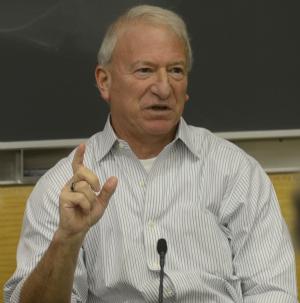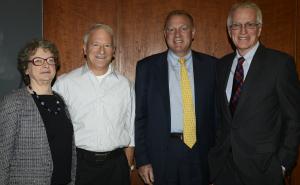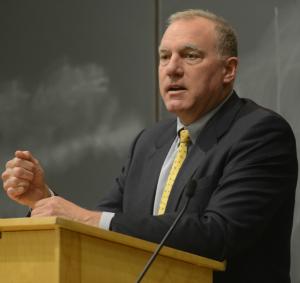Connecticut Attorney General, Labor Leader Discuss Response to Current Labor Environment
Experts say globalization and the Information Age have made workers more likely to pursue independent ventures, and employers more likely to illegally misclassify workers as independent contractors, altering the traditional employee-employer relationship
| Andy Stern, Senior Fellow, Richard Paul Richman Center for Business, Law, and Public Policy |
New York, November 30, 2012—Connecticut Attorney General George Jepsen and Andy Stern, senior fellow at the Richard Paul Richman Center for Business, Law, and Public Policy, addressed changes in the labor market at “The Changing Nature of Employment Relationships,” a panel discussion hosted on Nov. 20 by the National State Attorneys General Program at Columbia Law School.
The event, which featured an interactive session with Columbia Law School students and community activists, centered on the unique questions concerning state regulation of employers as traditional employment models break down in the face of what Stern referred to as only the "third economic revolution in the history of the world." Stern is the former president of the Service Employees International Union.
| (left to right) SJI Dean Ellen P. Chapnick, Richman Center Senior Fellow Andy Stern, Connecticut AG George Jepsen, and National State Attorneys General Program Director James E. Tierney |
Following introductions from Dean for Social Justice Initiatives Ellen P. Chapnick and National State Attorneys General Program Director James E. Tierney, Stern detailed the tremendous effects that economic globalization and the Information Age have had on employment relationships: Individuals move more frequently and easily from job to job; workers are more likely to pursue independent ventures; and people increasingly distinguish their job from their career, holding an average of nine jobs before their 35th birthday.
| Connecticut Attorney General George Jepsen |
Attorney General Jepsen then addressed the questions facing state regulators as these changes take effect. Specifically, Jepsen considered the issue of employers misclassifying employees as independent contractors to avoid paying taxes and workers’ compensation, allowing them to offer cheaper services or products than law-abiding competitors.
Jepsen spoke about the importance of preventing this behavior, as well as the increasing difficulty in drawing the line between employees and independent contractors.
After taking questions from the audience, Stern and Jepsen met with fellow regulators and members of the National State Attorneys General Program, exchanging ideas to improve regulation of the employment field as it changes shape.
After taking questions from the audience, Stern and Jepsen met with fellow regulators and members of the National State Attorneys General Program, exchanging ideas to improve regulation of the employment field as it changes shape.


